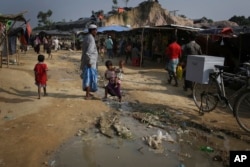The U.N. children’s fund (UNICEF) reports tens of thousands of Rohingya children are living under appalling, prison-like conditions, with little or no access to basic services in Myanmar’s Rakhine State.
More than 655,000 Rohingya have fled to Cox’s Bazar, Bangladesh, since the end of August to escape violence and persecution in Myanmar’s northern Rakhine State. About half of those are children.
UNICEF senior advisor Marixie Mercado recently returned from a month-long visit to Myanmar. She said it was difficult to get a true picture of the children remaining there because of lack of access.
But she was able to obtain, what she calls a deeply troubling view of the precarious existence of children living in central Rakhine State. Mercado said more than 60,000 Rohingya children remain there, almost forgotten and trapped in 23 camps where they were driven by violence in 2012. She described conditions of two camps she visited.
“The two camps are below sea level. There is almost no tree cover. The first thing that you notice when you reach the camps is the stomach-churning stench. Parts of the camps are literally cesspools. The shelters teeter on stilts above garbage and excrement. In one camp, the pond where people draw water from is separated by a low mud wall from the sewage,” said Mercado.
Mercado said children walk barefoot through the muck and invariably some of them die from accidents and disease. She said it is extremely difficult for Rohingya to leave their camps for medical treatment. So, people are turning to traditional healers, untrained physicians or self-medication.
She said basic living conditions and access to lifesaving services urgently need to be improved. She said children are also suffering from an inability to get a decent education. She said learning takes place in poorly equipped temporary classrooms, with determined volunteer teachers who have little formal training.








